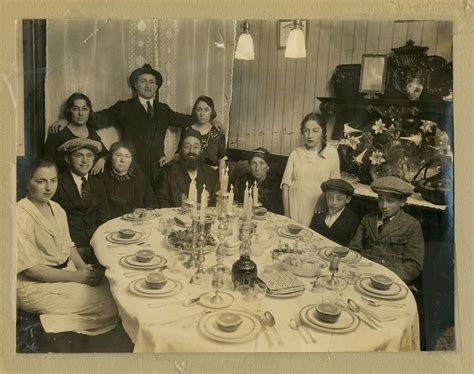Make the Seder meaningful and inspiring for all
 Calm down! You will do a fantastic job, because there is one amazing quality to the Passover Seder -- it practically leads itself. At one in the same time, it is its own textbook and its own exam. It tells us the story, explains the rituals we perform, and yet challenges us with questions -- explicit and implied -- that cut to the very core of who we are and what kind of world we live in.
Calm down! You will do a fantastic job, because there is one amazing quality to the Passover Seder -- it practically leads itself. At one in the same time, it is its own textbook and its own exam. It tells us the story, explains the rituals we perform, and yet challenges us with questions -- explicit and implied -- that cut to the very core of who we are and what kind of world we live in.
Your job as leader of the Seder is to " go with the flow" of the Hagadah and allow each section to come to life by involving all of the participants at the Seder.
The three essential ingredients of successful Seder leading are:
-
Sincerity
-
Respect
-
Questions
Sincerity
I follow the Orthodox approach to Judaism, especially at the Seder. Almost all of the guests at our Seder do not come from an Orthodox background. And every year they tell me the same stories about other Seders that they've been to. The complaint is almost universal: they rushed through everything and even made fun of some of the rituals.
I promise you that a Seder where speed is of the essence and where rituals are an endless source of jokes will not inspire anyone. Don't get me wrong, I always move the Seder along at a good pace. At the beginning, I announce exactly when we will arrive at the festival meal, so that nobody feels insecure.
And then, we do it exactly by the book, each ritual being performed with sincerity. If you have kids at the Seder, this is the most important element! If they see that you treat your Judaism with sincerity, that is the most valuable lesson you can ever give them. Kids watch to see what is really important to their parents and mentors.
So we eat the required amounts, lean where we are supposed to lean, wash where we are supposed to wash and recite the entire Hagadah without omission.
Respect
Every person sitting at your table has something supremely worthwhile to contribute. Showing respect even to those who are very far from Judaism is a necessity. For many people, the Seder is Judaism on trial. If you show them respect, they will participate. If they participate, wonderful things will happen. First of all, they will taste the beauty of tradition. Second of all, you will learn a lot from them.
The Hagadah tells us this explicitly. First of all, we have the four children: the wise, the evil, the simple, and the one who doesn't know how to ask. Let us not forget the fact that all four of these children, even the evil one, are there at the Seder table. If they are there, then they have not cut their ties to Judaism and their family. They deserve respect, and if they get it they will participate and be uplifted.
Furthermore, there is a passage where the 70 year-old sage had a proof explained to him by a much younger scholar. The content is a separate discussion, but the this is a lesson for all of us. Who is a wise person? One learns from any person, young or old, learned or unlearned.
Judaism teaches that if someone teaches me even one word of Torah, I must treat him with respect. All the more so the participants in your Seder who will teach you a lot.
Questions
There are more than four! Questions are the power-on button of the brain. Ask a good question and you turn the brain on. The brain will continue to work until it comes up with an answer. That's just the way we are. And the Hagadah is built of questions.
I strongly suggest having some sucking candies or other reward material on hand to use when a young person asks a good question. What I like to do is have everybody read each section in the language they understand. There is little point in asking people to read Hebrew if they don't understand it. Let them read the Hagadah in English.
Then, at the end of each section, I ask " who has the best question on this section?" . I do spend time before Passover preparing at least one or two questions on each section, so they will be available if needed. Rarely are they needed. Great questions arise just by asking for them.
So ask lots of questions, and you will get great answers. I believe that the questions should be rewarded even more than the answers! Remember, the four children are in a strange sequence. First is the wise, next is the evil, and at the very end is the one who can't ask a question. If we say that they are in order of importance, I would think the evil one should be last!
That's the lesson -- the evil one is not so bad because he is there and he is questioning. He may be anti, he may be embittered, but he is there and he is asking. He hasn't given up and he hasn't cut himself off. The one who doesn't even know how to ask is really the one in trouble. For them, it's a foreign language and a foreign concept that has zero relevance to their lives. That is a tragedy.
So these are the main elements in how to lead the Seder. Take some time before Passover to read through the Hagadah. Familiarize yourself with the rituals, so you will know how to instruct people in washing hands (when is it done without the blessing, and when with the blessing, how much green vegetable, why the matza is eaten while we are leaning on our left side and why don't we lean when eating the bitter herb, and so forth). Prepare a question or two for each section of the Hagadah (it's also a good idea to divide the Hagadah into small sections to be dealt with as you go).
And then, when the Seder begins, let the Hagadah guide you. Be sincere in the ritual and in the recitation, show great respect to each and every guest, young and old, and ask lots of questions!
Oh! This is, after all, greatjewishmusic.com! You've gotta sing all those songs with gusto! People wait the whole year for it.
In this section:
Passover Home ---
Adir Hu ---
Dayenu ---
Chad Gadya ---
The Four Questions ---
Hagada Thoughts ---
How to Lead the Passover Seder

 Calm down! You will do a fantastic job, because there is one amazing quality to the Passover Seder -- it practically leads itself. At one in the same time, it is its own textbook and its own exam. It tells us the story, explains the rituals we perform, and yet challenges us with questions -- explicit and implied -- that cut to the very core of who we are and what kind of world we live in.
Calm down! You will do a fantastic job, because there is one amazing quality to the Passover Seder -- it practically leads itself. At one in the same time, it is its own textbook and its own exam. It tells us the story, explains the rituals we perform, and yet challenges us with questions -- explicit and implied -- that cut to the very core of who we are and what kind of world we live in.